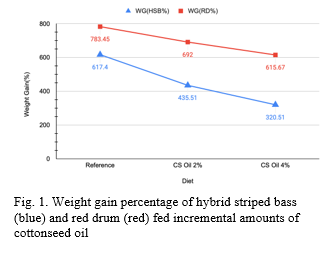EVALUATING THE EFFECTS OF DIETARY COTTONSEED OIL ON GROWTH PERFORMANCE OF JUVENILE RED DRUM Sciaenops ocellatus AND HYBRID STRIPED BASS Morone chrysops × M. saxatilis
According to results from previous studies conducted in our laboratory pertaining to dietary cottonseed flour utilization, palatability appeared to be reduced in diets whose formulations had higher amounts of cottonseed flour, which also contributed higher levels of lipid. Thus, two 6-week feeding trials were conducted in order to evaluate the effects of cottonseed oil extracted from cottonseed flour on juvenile red drum and hybrid striped bass. The basal diets for both trials were composed of practical ingredients to provide 45.9% crude protein and 8.88% lipid primarily from menhaden oil. Experimental diets were prepared by adding cottonseed oil at 2 or 4% by weight in place of menhaden oil.
The three diets were each fed to triplicate aquaria of juvenile red drum (initial weight 1.9 g/fish ± 0.033) and hybrid striped bass (1.4 ± 0.038 g/fish) which were stocked as groups of 14 fish in 38-L aquaria which were operated as a brackish water (3.5 ppt) recirculating system. Fish were group-weighed weekly and fed twice daily based on a percent of body weight that approached apparent satiation. At the conclusion of the 6-week trials, there were no significant (P>0.05) differences in weight gain percentage of red drum fed the diets with increasing levels of cottonseed oil although the trend was decreasing (Fig. 1). No differences in feed efficiency ratio, survival, fillet yield, intraperitoneal fat ratio, or condition factor were observed for red drum. In contrast, hybrid striped bass exhibited a significant decrease in weight gain as cottonseed oil increased in the diet (Fig. 1) although feed efficiency, survival, intraperitoneal fat ratio, fillet yield, or condition factor were not affected. Thus, results of this study showed increasing levels of cottonseed oil in place of menhaden oil tended to reduce weight gain of red drum and hybrid striped bass but was much more pronounced for hybrid striped bass .
